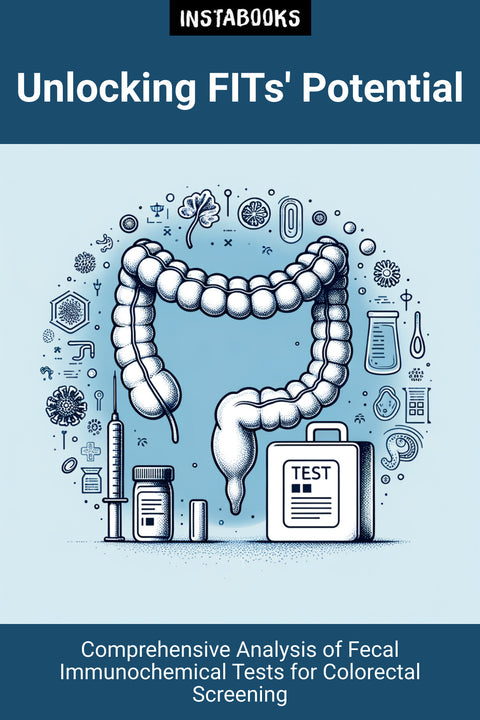
Unlocking FITs' Potential
Comprehensive Analysis of Fecal Immunochemical Tests for Colorectal Screening
Included:
✓ 200+ Page AI-Generated Book
✓ ePub eBook File — read on Kindle & Apple Books
✓ PDF Print File (Easy Printing)
✓ Word DOCX File (Easy Editing)
✓ Hi-Res Print-Ready Book Cover (No Logo Watermark)
✓ Full Commercial Use Rights — keep 100% of royalties
✓ Publish under your own Author Name
✓ Sell on Amazon KDP, IngramSpark, Lulu, Blurb & Gumroad to millions of readers worldwide
Introduction to Fecal Immunochemical Tests (FITs)
The world of colorectal cancer screening is vast and ever-evolving, with Fecal Immunochemical Tests (FITs) taking center stage due to their efficacy and accessibility. This comprehensive guide delves deep into the comparative performance of common FITs, drawing from extensive research and breakthroughs in the field. Designed for both medical professionals and informed readers, this book provides a detailed examination of FITs’ roles in colorectal cancer detection, aiming to unravel their potential through meticulous analysis.
Key Findings and Diagnostic Performance
Our exploration begins with an assessment of FITs’ adherence rates and their impressive screening participation, especially in randomized, controlled trials. Unlike traditional guaiac-based fecal occult blood tests, FITs offer superior adherence in diverse populations, with the ease of specimen collection at home. We analyze sensitivity and specificity variations among different FITs, offering insights into why some tests outperform others in detecting advanced colorectal neoplasia (ACN). Our detailed examination extends to comparing FITs with stool DNA tests, emphasizing diagnostic performance across various studies.
Trends: Accessibility and Cost-Effectiveness
At the heart of this analysis is the accessibility of FITs, making colorectal cancer screening viable in underserved and resource-poor settings. With a focus on cost-effectiveness and ease of use, this guide explores how FITs manage to be economical without compromising on quality. We identify key factors contributing to the high acceptability of FITs, promoting robust screening participation rates.
Future Research Directions and Implementation
Potential advancements are mapped out meticulously, guiding readers on optimizing sampling devices and understanding the regulatory policy impacts on FITs’ performance. This section also explores strategies for effective implementation across different populations, highlighting the success of FITs in global screening programs, particularly in underserved regions.
Implications for Practice and Policy
Finally, we draw meaningful connections between research findings and practical applications. This book offers actionable insights for healthcare providers, policy makers, and researchers looking to refine screening programs and enhance colorectal cancer detection. With emphasis on innovation and ongoing research, it presents a roadmap for leveraging FITs in reducing the burden of colorectal cancer worldwide.
Table of Contents
1. Understanding Fecal Immunochemical Tests- Introduction to FITs
- Historical Context and Development
- Impact on Public Health
2. Adherence and Participation Rates
- Improving Screening Engagement
- Comparisons with Alternative Tests
- Case Studies and Examples
3. Sensitivity and Specificity Exploration
- Assessing Test Variability
- Understanding Diagnostic Accuracy
- Latest Research Findings
4. FITs vs. Stool DNA Tests
- Comparative Diagnostic Performance
- Cost and Practicality Analysis
- Clinical Trial Insights
5. Accessibility and Cost-Effectiveness
- Expanding Access in Low-income Areas
- Cost Benefits Compared to Other Methods
- Long-term Economic Implications
6. Acceptability Among Populations
- Cultural Acceptance Factors
- Patient Satisfaction Surveys
- Improving Public Awareness
7. Future Directions in FIT Development
- Innovations in Test Design
- Enhancing Test Reliability
- Futuristic Projections
8. Implementation Strategies
- Tailoring Programs to Fit Resources
- Addressing Regulatory Challenges
- Leveraging Community Health Initiatives
9. FITs for Underserved Areas
- Overcoming Resource Limitations
- Success Stories Globally
- Strategies for Effective Outreach
10. Policy Implications of FIT Adoption
- Guiding Healthcare Decisions
- Impact on National Screening Guidelines
- Balancing Regulation with Innovation
11. Optimizing Sampling and Test Devices
- Advancements in Device Technology
- Improving Collection Efficiency
- Testing Accuracy Enhancements
12. Reflecting on Current Research
- Analyzing Recent Studies
- Filling Gaps in Existing Data
- Guiding Future Research Priorities
Target Audience
Healthcare professionals, medical researchers, policymakers, and informed readers interested in colorectal cancer screening advancements.
Key Takeaways
- Comprehensive understanding of FITs and their role in colorectal cancer screening.
- Insights into adherence rates and their impact on screening participation.
- Comparison between FITs and stool DNA tests regarding diagnostic performance.
- Analysis of FITs' accessibility and cost-effectiveness in various settings.
- Overview of current and future research directions related to FITs.
